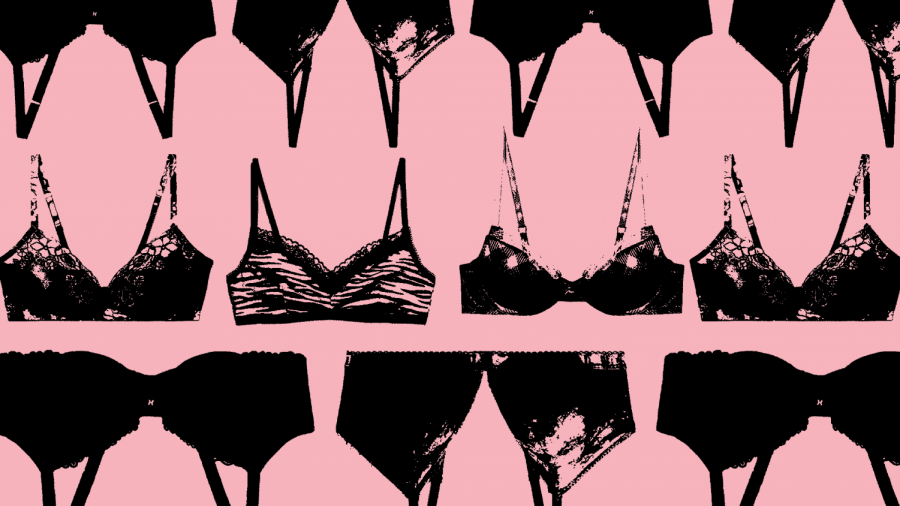Soter: Is the Lingerie Industry Still Sexist?
(Photo Illustration by Piper Armstrong | The Daily Utah Chronicle)
June 10, 2021
Like most girls, I vividly remember my first bra-shopping experience. My mother decided that my developing body needed some support (so to speak), so off to Victoria’s Secret we went. It felt like a rite of passage to womanhood. Looking back, we were actually supporting one of the most sexist industries in the world. But since that shopping trip, I’ve seen the lingerie industry shift into one that has the ability to empower women.
Women have varying opinions on lingerie and whether or not it should be considered a token of feminism. Some think that it epitomizes women’s liberation, while others believe it’s a patriarchal ploy posed to benefit men both sexually and financially. I tend to side closer with the latter, but I don’t have any grievances with lingerie itself. Instead, my dismay lies with the industry. Now the consumer must decide where they stand on the issue.
As someone who’s struggled with self-esteem issues, I’m not one to judge others for wearing certain garments that make them feel confident and beautiful. In fact, I am an advocate of this approach. However, I will judge the lingerie industry’s tendency to heavily overprice minimal amounts of clothing. This antithetical approach gives way to yet another system that benefits men and puts down women.
The lingerie industry has historically been marketed to and by men. One of the leading intimate wear brands in the country, Victoria’s Secret, was founded by a man. Roy Raymond started the company to give men a judgment-free place to buy lingerie for their wives — not for wives themselves.
More than 40 years later, the current CEO is still a man. Of course, the misogynistic history of Victoria’s Secret may not surprise many after the intense societal and financial nose-dive the company recently took. In 2018, a former executive made transphobic remarks, which resulted in calls to boycott Victoria’s Secret.
As a result of Victoria’s Secret’s fall, the brand Aerie, owned by American Eagle, unsurprisingly took a majority of their customer pool. Many know Aerie for their all-inclusive, gender-affirming and empowering advertising. But similar to Victoria’s Secret, a strategic team of men stands behind Aerie’s intriguing marketing. And as all good marketers know: you give the customer what they want.
All this to say, the mainstream lingerie industry has changed dramatically, but only because the consumer’s mindset has changed dramatically. The feminist movement flipped the lingerie narrative on its head. Many women have taken sexy attire, traditionally known as a symbol of sexism and female objectification and have worked hard to transform it into a symbol of feminism.
But men, as executives and consumers, still run the lingerie industry. Until that changes, women will continue to buy lingerie for men, both figuratively and literally.
Thankfully, many women recognize this reality and know that the lingerie industry must transform into a women-run industry that empowers all women, not restrains. Many powerful females have already begun creating their own lingerie brands.
But there is another problem. While we may no longer lack a supply of women-made lingerie products, high prices are still an issue.
Take for example, Lonely, a female-ran lingerie company. I don’t know about the ladies reading this, but as much as I’d love to invest in this fabulous lacy one-piece from Lonely, I don’t have the money in my bank account. Needless to say, the cost of lingerie is outrageous, especially from start-up brands that prioritize comfort and quality as much as beauty.
The frustrating part is, most women buy lingerie products such as bras out of necessity. A study found that the average woman spends about $4,000 on bras alone throughout their lifetime. How much does the average heterosexual cisgender man spend on bras throughout their lifetime? About $4,000 less. So while many brands have grown to be “by women, for women,” affordability is just the cherry on the sundae of the problems still plaguing the industry.
But we shouldn’t lose hope. It’s possible that the initiative to buy women-made undergarments will become a part of the same revolutionary movement that gave women access to proper birth control and the right to vote. Eventually, Lonely will become the next Aerie, and Aerie will become the next Victoria’s Secret. Eventually, the lingerie industry will become the women-made industry it always should have been. All it will take is women supporting women. And it starts with you.









